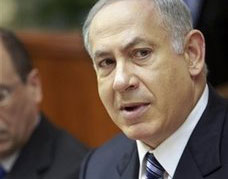Netanyahu blames Arabs for clash
JERUSALEM: Prime Minister Benjamin Netanyahu accused Muslim extremists of being behind recent violence in Jerusalem and said Monday they spread baseless lies to "undermine the peaceful life" in the holy city.
The comments followed days of low-level unrest at the city's most sacred shrine. The violence has added to regional tensions fueled by stalled peace efforts, Israeli construction in Jewish settlements and a U.N. report accusing Israel of committing war crimes in the Gaza Strip.
Late Sunday, Palestinian President Mahmoud Abbas accused Israel of "Judaizing" Jerusalem and undermining Palestinian claims to the city.
In an about-face, he also announced he would push for a vote in the U.N. on the Gaza report, a move that could ultimately lead to war crimes proceedings against Israel.
Israel put thousands of police on high alert in Jerusalem last week after several days of scuffles between police and Palestinians around the disputed hilltop compound known to Jews as the Temple Mount and to Muslims as the Noble Sanctuary.
The competing claims to the site — home to the biblical Jewish Temples and to the Al Aqsa Mosque — is seen as the most intractable issue in the Israeli-Palestinian conflict.
Arab protests around the site were fed in part by rumors by local Muslim leaders that Israel was digging tunnels under the mosque and planning to take over the site.
"I wish to clarify. This is an unfounded lie," Netanyahu told his Cabinet on Monday.
"Last week, extremists tried to undermine the peaceful life in Jerusalem," he said. "I appreciate the fact that the vast majority of Arab Israeli citizens did not follow the provocations and did not let the extremists exploit the lies." He also appealed for coexistence with Israel's Arabs, who make up about one-fifth of Israel's 7 million citizens.
Netanyahu's comments were his first on the Jerusalem unrest, which has added to growing mistrust of the Israeli leader in the Arab world.
Israel and the Palestinians both claim Jerusalem. Netanyahu insists Israel will retain control over the entire city, including the eastern sector it captured and annexed in 1967. The Palestinians claim east Jerusalem, home to the most sensitive religious sites, as the capital of a future independent state.
The dispute over Jerusalem has been one of the factors in President Barack Obama's inability to restart Israeli-Palestinian peace talks. Obama's envoy, George Mitchell, left the region on Sunday after again having failed to reach a deal on resuming talks.
The Palestinians say they won't resume talks unless Israel agrees to discuss the fate of east Jerusalem and halts all construction in settlements built there and in the neighboring West Bank. Netanyahu says he will never share control of the holy city, and that some settlement construction must continue to accommodate "natural growth" in settler populations.
In his televised speech Sunday, Abbas accused Israel of undermining Palestinian hopes for independence through its policies in east Jerusalem.
"The Al Aqsa Mosque has become a specific target of the occupation and the extremists. So has Judaizing Jerusalem and changing the Islamic and Arab features of the city," he said. "Toying with the city will lead to nothing but war in the region."
Abbas also said he would push for a vote on the United Nations report that accuses Israel and Hamas militants of committing war crimes during fighting last winter. Abbas' statement reverses a decision earlier this month when Palestinian officials led by Abbas said they would delay the vote in the U.N. Human Rights Council for six months.
The decision, which came under heavy U.S. pressure, sparked sharp criticism and protests across Palestinian society, particularly from the rival Hamas militant group's government in the Gaza Strip. It left Abbas at the lowest point in his presidency and he has been scrambling since to repair the damage.
"I have instructed our ambassador in Geneva to contact the groups to have an exceptional session of the council, and to move in this direction until in the end, having those who committed the worst, ugliest crimes against our people punished," Abbas said.
It remained unclear if renewed Palestinian support would bring about a vote. However, the council includes many Palestinian allies and has a history of passing resolutions highly critical of Israel.
Netanyahu has warned the Palestinians that peace prospects would be significantly damaged if they pushed forward with the war crimes case against Israel.
Israel launched the three-week offensive last December in response to years of Hamas rocket attacks on southern Israel. More than 1,400 Palestinians were killed, most of them civilians, according to Palestinian officials and human rights groups.
The U.N. report accused Israel of using disproportionate force, deliberately harming civilians and destroying civilian infrastructure, and using people as human shields. It also accused Hamas of deliberately targeting civilians and trying to spread terror through its rocket attacks.






